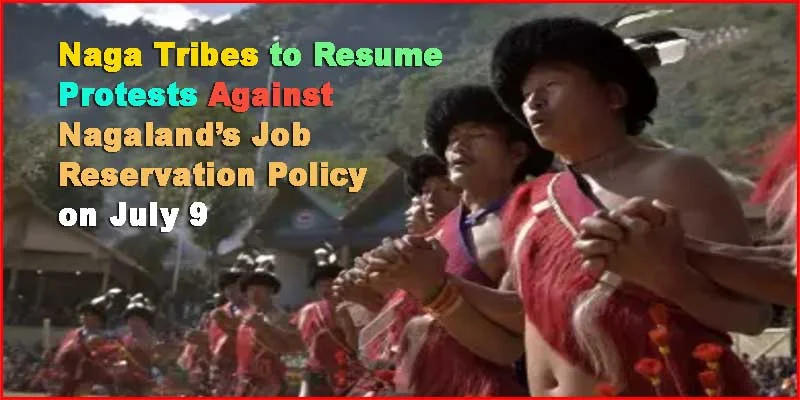
Naga tribes have announced plans to resume protests against Nagaland’s job reservation policy, citing concerns over equitable representation and perceived bias in the current quota system. The agitation is being led by the Central Nagaland Tribes Council (CNTC) and other tribal bodies.
The Committee on Review Reservation Policy (CRRP), comprising five major Naga tribes — Angami, Ao, Lotha, Rengma, and Sumi — has announced a renewed protest against the existing job reservation policy in Nagaland from July 9, 2025. The protest demands a review of the reservation framework, in place since 1977, which currently benefits 11 “backward” Naga tribes, including those in Eastern Nagaland.
Background: Nagaland’s Reservation Policy
In 1977, Nagaland introduced a reservation policy providing job quotas in government services for 11 Naga tribes deemed “backward.”
In 1989, the State government issued an order continuing the reservation indefinitely, without periodic review.
Despite calls for reassessment, the policy has remained unchanged for nearly five decades.
Demands of the Protesting Tribes
Review the policy to reflect current socio-economic and educational conditions.
Emphasize equity and fairness among tribes, especially those who believe their development status has been underrepresented or misrepresented.
The Committee clarifies that it is not against reservation itself, but demands rationalisation based on updated data.
Government Response
Deputy CM Yanthungo Patton initially assured a review commission would be constituted by June 17, 2025.
However, Chief Minister Neiphiu Rio later stated on July 2 that:
The issue is “very detailed” and requires time.
Any administrative change, including reservation reform or delimitation, should ideally follow the 2027 Census.
Why This Matters: Key Issues at Stake
1. Equity Among Tribes:
Some tribes feel left out of benefits despite similar or worse socio-economic conditions.
Others argue that those categorized as “backward” have advanced significantly, making the current classification outdated.
2. Lack of Periodic Review:
Reservation systems are generally meant to be dynamic, with regular reviews to assess their continuing relevance.
Failure to reassess creates inequities and perceptions of permanent entitlements.
3. Political Sensitivity in Tribal Regions:
Any reclassification can trigger inter-tribal tensions and identity-based grievances, especially in ethnically diverse states like Nagaland.
Wider Implications
A. For Reservation Policy Nationally:
Highlights the need for periodic data-based review of reservation policies across India.
Raises a broader question: Should caste/tribal-based reservations expire or evolve as socio-economic conditions improve?
B. For Governance in the Northeast:
Shows how tribal autonomy, ethnic politics, and affirmative action intersect in complex ways.
Delays in administrative action can risk social unrest and loss of trust in democratic processes.
Challenges Ahead
Balancing tribal sensitivities while ensuring fair distribution of state resources.
Collecting reliable data in a region with logistical and infrastructural challenges.
Managing political fallout if the review leads to withdrawal or reallocation of quotas.
Way Forward
Constitute a Statutory Commission:An independent body with tribal representation should be formed to assess socio-economic indicators and make recommendations.
Conduct a Socio-Economic Caste Census (SECC):A state-specific SECC could inform policy better than the decadal Census.
Ensure Transparent Deliberation:Make the commission’s findings public and involve all stakeholders in decision-making to avoid unrest.
Short-Term Confidence-Building Measures:Continue dialogue, and possibly freeze new quota decisions until 2027, but start the review process now.
Conclusion
The agitation by the major Naga tribes reflects a long-standing demand for rationalisation of affirmative action policies in Nagaland. It illustrates the broader challenges India faces in balancing social justice with dynamic realities. A timely, data-driven, and consultative approach is the only viable path forward to maintain both equity and harmony in a complex tribal society.
UPSC Mains Practice Question
Ques: The prolonged application of the reservation policy in Nagaland without periodic review has led to inter-tribal discontent and calls for reform. Critically examine the challenges and implications of maintaining static affirmative action policies in dynamic socio-economic contexts. Suggest a way forward for inclusive and equitable governance in tribal-dominated states.(250 Words)
12-Jul-2025 05:35 PM
Prime Minister Narendra Modi emphasized the critical role of the...
12-Jul-2025 05:26 PM
Endocrine disruptors found in plastic waste pose a serious public...
12-Jul-2025 04:26 PM
Prime Minister emphasized that BRICS aims to create a balanced,...
12-Jul-2025 04:17 PM
A recent study highlights that the Sinhalese community of Sri...
08-Jul-2025 05:33 PM
A renewed global and national commitment has been made to...
08-Jul-2025 05:21 PM
The Andhra Pradesh government has approved the Amaravati Quantum Valley...
08-Jul-2025 02:41 PM
A rare Roll Cloud was recently spotted, showcasing a horizontal,...
08-Jul-2025 05:21 PM
The Andhra Pradesh government has approved the Amaravati Quantum Valley...
08-Jul-2025 05:33 PM
A renewed global and national commitment has been made to...
Leave a Comment